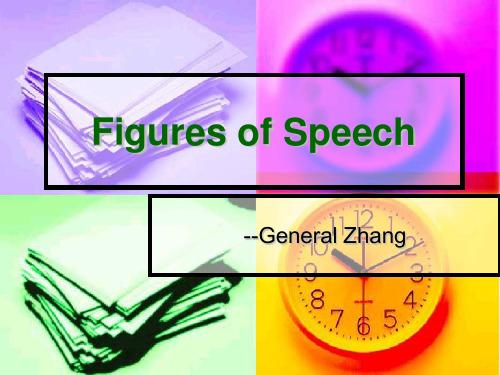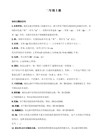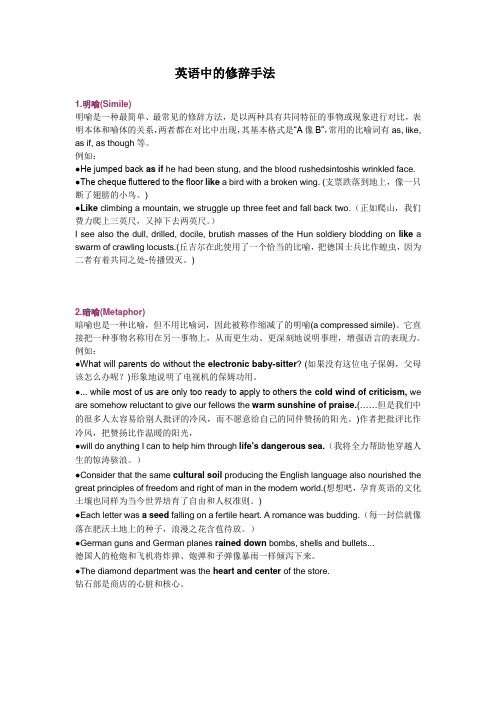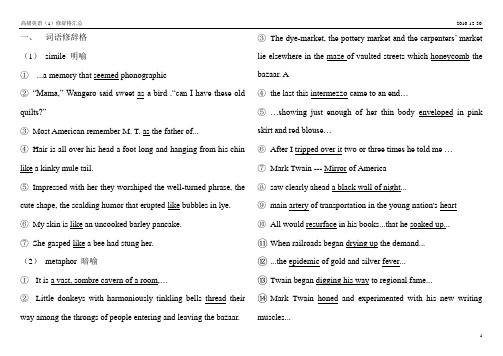英语修辞格完整版
英语修辞格简介

Examples No one was more willing to do a favor for a friend or neighbor than he. The face wasn’t a bad one; it had what they called charm. Last week I saw a woman flayed, and you will hardly believe how much it altered her person for the worse.
English Rhetoric
第三章 对照并列修辞格 10.相映相衬的antithesis(对 照) The rhetorical opposing or contrasting of ideas by means of grammatically paralleled arrangements of words, clauses or sentences.
English Rhetoric
7.闪烁其词的euphemism(委 婉) A figure of speech in which something of an unpleasant, distressing, or indelicate nature is described in less offensive terms.
English Rhetoric
6.明抑暗扬的 understatement(低调陈述) A figure of speech which contains an understatement of emphasis, and therefore the opposite of hyperbole.
Examples The seed ye sow, another reaps; the wealth ye find, another keeps; the robes ye weave, another wears; the arms ye forge, another bears. 你们播下了种子,别人来收割; 你们找到了财富,别人来占有; 你们织布成衣,穿在别人身上; 你们锻造武器,握在别人手上。
英语修辞手法整理版

1.parallelism 平行结构1)I felt foolish, self-conscious and clumsy.2)He is totally consistent in what he says and how he does it.3)Let every nation know, whether it wishes us well or ill, that we shall pay any price, bearany burden, meet any hardship, support any friend, oppose any foe to assure the survival and success of liberty.2.anadiplosis 连珠1)He gave his life; life was all he could give.2)It‟s the profit now, not the product. Half the time we cheat the foreman, the foremancheat the management, the management cheat the customers. And the customers are we.3.pun 双关语1)Then there was the man in the restaurant.“You are not eating your fish,” the waitress said to him.“Anything wrong with it?”“Long time no sea,” the man replied.2) My faith has gone.3) I‟m almo st finished.4) Try our sweet corn. You will smile from ear to ear.5)I finally figured out how government works. The Senate gets the bill from the House, thePresident gets the bill from the Senate, and we get the bill for everything.6)“Fourth floor,” sho uted the passenger to the elevator.“Here you are, son.”“How dare you call me …son‟?”“Sir, I called, or whatever, I‟ve brought you up, anywhere.”4.Simile 明喻/直喻1)New China is like a red sun rising in the east.2) She spoke hurriedly, as if her heart had leaped into her throat at the boy‟s words.5.metaphor 暗喻/隐喻1)Joe was a lion in the battle.2) Learning was climbing the mountain.6.allegory 讽喻,寓意1)No rose without a thorn(刺).2) It‟s time to t urn swords into ploughs.3) All that glitters is not gold.7.synecdoche 提喻即汉语中的指代1)More hands are needed at the moment.2) The famous port used to be a harbor which is crowded with masts桅杆.8.personification 拟人法1)The sun kissed the green field.2) The thirsty desert drank up the water.3) The trees and flowers around them danced heartily as if touched by merry mood.9.oxymoron 矛盾修饰法1)cruel kindness2) dully bright3) the sound of silence4) white darkness10.paradox 反论,拟论即悖论1)More haste, less speed.2) The child is father to the man.11.euphemism 委婉语1)I was wondering if you could spare a few minutes to go over my report.2) I don‟t think that it is his idea.3) I would like to hear your views.4) He is now staying at the correctional center.2)I have to retire for a moment. (My I go somewhere?)12.alliteration 头韵1)Promise, Problem and provision1)US trade policy is often viewed as inconsistent, incoherent, and incomprehensible to thecountries of the origin.2)One man‟s disaster is another man‟s delight.3)Fine and fit.13.assonance 母韵,元音韵1)fair and square, near and dear2)The rain in Spain stays mainly in the plain.14.consonance 尾韵1)healthy and wealthy2)Fit or fat?3)When I lent, I was a friend; when I asked, I was unkind.4)Rough and tough.5)There is probability rather than certainty6)Spare the rod, spoil the child.。
英语修辞学中20种常见修辞格名称双语释义及举例

What does that lawyer do after he dies?——Lie still. 那个律师死后干什么?──躺着仍说鬼话。(注:lie躺, 撒谎;still安静地, 仍然)
E. oxymoron; zeugma ; contrast
Oxymoron(矛盾修辞法)与汉语中的反映辞格类似,都是将相互矛盾的概念和判断巧妙地联系在一起,以便相互映衬,突出事物的特点,表达复杂的思想感情和意味深长的哲理。矛盾修辞手法在英语中常见,但在汉语中很少见。如:sweet sorrow 忧喜参半 (不是甜蜜的悲伤); proud humility 不卑不亢(不是骄傲的谦卑)
这个项目从一开始就是一个摆脱不了的经济难题。(Albatross是英国诗人柯勒律治的《古舟子咏》中的信天翁,它被忘恩负义的水手杀死后,全船陷入灾难中。)
B. metonymy; transferred epithet Metonymy、synecdoche和_1antonomasia都是不直接说出事物的本来名称,而换用另一个名称或另一个说法。它们大体上相当于汉语的借代(分为旁借和对代两类)。如Crown(王冠)可喻指君主、王权、王国政府等;doll(玩具)可喻指姑娘、宝贝等。再如:
as thick as thieves亲密无间(不是"像贼一样厚")
as old as the hills古老 (不是"像山一样老")
The ship plows the sea. 船在乘风破浪地前进。(不是"船在犁海")
Allusion与汉语的暗引相近似。其特点是不注明来源和出处,一般多引用人们熟知的关键词或词组,将其融合编织在作者的话语中。引用的东西包括典故、谚语、成语、格言和俗语等。英语引用最多的是源出《圣经》故事以及希腊、罗马神话、《伊索寓言》和那些渊源流长的谚语、格言等。例如:
英语常见修辞格总结

脏几乎都停止了跳动。
反语Irony['airəni]
反语(irony)是指用含蓄的褒义词语来表示 其反面的意义,从而达到使本义更加幽默, 更加讽刺的效果。(正话反说或是反话正说) 1、It would be a fine thing indeed not knowing what time it was in the morning. 2、Well, of course, I knew that gentlemen like you carry only large notes.
顾名思义,音韵修辞格是利用词语的语音特 点创造出来的修辞手法。 它主要包括 拟声(onomatopoeia)、头韵 (alliteration)这两种修辞格。
拟声 Onomatopoeia [,ɒnəmætə'piːə]
Onomatopoeia 是模仿事物发出的声响的修 辞手法,与汉语的拟声用法完全相同。 1、Presently there came the click of highheeled shoes. 高跟皮鞋声阁阁地传了过来。 2、 On the root of the school house some pigeons were softly cooing. 在学校房屋的屋顶
三、句法修辞格(syntactical rhetorical devices)
句法修辞法主要是指通过句子结构的均衡布 局或是突出重点创造出来的修辞手法。 这类修辞格主要包括 叠言 rhetorical repetition, 反问rhetorical question, 对偶 antithesis等。
明喻 simile和暗喻metaphor
明喻(simile)是以两种 具有相同特征的事物和 现象进行对比,表明本 体和喻体之间的相似关 系。
英语修辞格汇总

Flaming flowers that brightly blaze
Effects
Add rhyme in the context.
Get musical effects.
Leave the readers or audience deep impression.
It is very common in our daily talk, such as "very, verybig”
Intermittent repetition间隔重复:refers to the way the repeated words, phrases or sentences are separated by some other words, phrases or sentences.
语音层面的修辞格
Alliteration /əˌlɪtəˈreɪʃn/ 头韵
Definition
Alliteration is the repetitionofinitial consonantin two or more words that areclose together
Examples
Pride and prejudice
Assonance /ˈæsənəns/ 押元音韵&Consonance /ˈkɒnsənəns/ 压辅音韵
Definition
Assonance is the repetition or resemblance ofvowel soundsin thestressed syllablesof a sequence of words,preceded and followed bydifferent consonants.
(完整版)英语中的修辞手法

英语中的修辞手法1.明喻(Simile)明喻是一种最简单、最常见的修辞方法,是以两种具有共同特征的事物或现象进行对比,表明本体和喻体的关系,两者都在对比中出现,其基本格式是“A像B”,常用的比喻词有as, like, as if, as though等。
例如:●He jumped back as if he had been stung, and the blood rushedsintoshis wrinkled face.●The cheque fluttered to the floor like a bird with a broken wing. (支票跌落到地上,像一只断了翅膀的小鸟。
)●Like climbing a mountain, we struggle up three feet and fall back two.(正如爬山,我们费力爬上三英尺,又掉下去两英尺。
)I see also the dull, drilled, docile, brutish masses of the Hun soldiery blodding on like a swarm of crawling locusts.(丘吉尔在此使用了一个恰当的比喻,把德国士兵比作蝗虫,因为二者有着共同之处-传播毁灭。
)2.暗喻(Metaphor)暗喻也是一种比喻,但不用比喻词,因此被称作缩减了的明喻(a compressed simile)。
它直接把一种事物名称用在另一事物上,从而更生动、更深刻地说明事理,增强语言的表现力。
例如:●What will parents do without the electronic baby-sitter? (如果没有这位电子保姆,父母该怎么办呢?)形象地说明了电视机的保姆功用。
●... while most of us are only too ready to apply to others the cold wind of criticism, we are somehow reluctant to give our fellows the warm sunshine of praise.(……但是我们中的很多人太容易给别人批评的冷风,而不愿意给自己的同伴赞扬的阳光。
(完整word版)高级英语(1)修辞格汇总

一、词语修辞格(1)simile 明喻①...a memory that seemed phonographic②“Mama,” Wangero said sweet as a bird .“can I have these old quilts?”③Most American remember M. T. as the father of...④Hair is all over his head a foot long and hanging from his chin like a kinky mule tail.⑤Impressed with her they worshiped the well-turned phrase, the cute shape, the scalding humor that erupted like bubbles in lye.⑥My skin is like an uncooked barley pancake.⑦She gasped like a bee had stung her.(2)metaphor 暗喻①It is a vast, sombre cavern of a room,…②Little donkeys with harmoniously tinkling bells thread their way among the throngs of people entering and leaving the bazaar. ③The dye-market, the pottery market and the carpenters’ market lie elsewhere in the maze of vaulted streets which honeycomb the bazaar. A④the last this intermezzo came to an end…⑤…showing just enough of her thin body enveloped in pink skirt and red blouse…⑥After I tripped over it two or three times he told me …⑦Mark Twain --- Mirror of America⑧saw clearly ahead a black wall of night...⑨main artery of transportation in the young nation's heart⑩All would resurface in his books...that he soaked up...⑪When railroads began drying up the demand...⑫...the epidemic of gold and silver fever...⑬Twain began digging his way to regional fame...⑭Mark Twain honed and experimented with his new writing muscles...⑮The Duchess of Croydon kept firm, tight rein on her racing mind.⑯Her voice was a whiplash.⑰and launch this cataract of horrors upon mankind…⑱But all this fades away before the spectacle which is now unfolding.⑲I see the German bombers and fighters in the sky, still smarting from many a British whipping, delighted to find what they believe is an easier and a safer prey.⑳I see the Russian soldiers standing on the thresthold of their native land, guarding the fields which their fathers have tilled from time immemorial.21The Nazi regime is devoid of all theme and principle except appetite and racial domination.22I suppose they will be rounded up in hordes.23We shall fight him by land, we shall fight him by sea, we shall fight him in the air, until, with God’s help, we have rid the earth of his shadow and liberated its peoples from his yoke.(3)metonymy 借代,转喻①In short, all of these publications are written in the language that the Third International describes②The Washington Post, in an editorial captioned "Keep Your Old Webster's"(4)synecdoche 提喻①The case had erupted round my head②The case had erupted round my head Or what of those sheets and jets of air that are now being used, in place of old-fashioned oak and hinges ...③But neither his vanity nor his purse is any concern of the dictionary's(5)personification 拟人①…until you round a corner and see a fairyland of dancing flashes…②Every here and there, a doorway gives a glimpse of a sunlit courtyard, perhaps before a mosque or a caravanserai, where camels lie disdainfully chewing their hay…③...to literature's enduring gratitude...④The grave world smiles as usual...⑤Bitterness fed on the man...⑥America laughed with him.⑦Personal tragedy haunted his entire life.(6)transferred epithet 移就①Darrow had whispered throwing a reassuring arm round my shoulder②The obese body shook in an appreciative chuckle.③Two high points of color appeared in the paleness of the Duchess of Croydon’s cheeks.④I have been exhilarated by two days of storms, but above all I love these long purposeless days in which I shed all that I have ever been. (V. Sackville-West, No Signposts in the Sea)(7)hyperbole 夸张①The roadway is about twelve feet wide, but it is narrowed every few yards by little stalls where goods of every conceivable kind are sold.②I feel my whole face warming from the heat waves it throws out.③If Hitler invaded Hell and would make at least a favorable reference to the Devil in the House of Commons.④I see the ten thousand villages of Russia where the means of existence is wrung so hardly from the soil, but where there are still primordial human joys, where maidens laugh and children play. ⑤...cruise through eternal boyhood and ...endless summer of freedom...⑥The cast of characters... - a cosmos.⑦America laughed with him.⑧The trial that rocked the world⑨His reputation as an authority on Scripture is recognized throughout the world."(8)oxymoron 矛盾修饰法Dudley Field Malene called my conviction a, "victorious defeat. " (9)euphemism 委婉语①… a motley band of Confederate g uerrillas who diligently avoided contact with the enemy.②...men's final release from earthly struggle(10)irony -- the use of words to express something different from and often opposite to their literal meaning. 反语用词语表达与它们的字面意思相异或相反的用法①Hiroshima—the “liveliest” city in Japan②“Maggie’s brain is like an elephant’s”. Wangero said, laughing .③… until we are marching backwards to the glorious age of the sixteenth century(11)sarcasm -- a cutting, often ironic remark intended to wound. 讽刺,挖苦意在伤害他人的尖刻的,常带讽刺意味的话语①My friend the attorney-general says that John Scopes knows what he is here for," Darrow drawled. "I know what he is here for, too. He is here because ignorance and bigotry(顽固) are, and it is a mighty strong combination.②There is some doubt about that.③a concept of how things get written that throws very little light on Lincoln but a great deal on Life④the Post’ s editorial fails to explain what is wrong with the definition, we can only infer from "so simple" a thing that the writer takes the plain, downright, man-in-the-street attitude that adoor is a door and any damn fool knows that(12)ridicule(嘲笑)Words or actions intended to evoke contemptuous laughter at or feelings toward a person or thing 愚弄有意激起对某人或某事的蔑视的笑或看不起的感情而说的话或做的事①Bryan, ageing and paunchy, was assisted②Resolutely he strode to the stand, carrying a palm fan like a sword to repel his enemies.③Bryan mopped his bald dome in silence.(13)pun 双关①DARWIN IS RIGHT – INSIDE.②Benjamin Franklin: “If we don’t hang together, we shall most assuredly hang separately.” (Peter stone and Sherman Edwards. 1776) 如果我们不能紧密地团结在一起,那就必然分散地走上绞刑架。
英语修辞格汇总(高级英语第一册)

1.明喻simileSimilereferstoadirectcomparisonbetweentwoormorethings,normallyintroducedbylikeoras. Hehasbeenasdrunkasafiddler ’sbitch.他醉得像小提琴手的母狗。
他曾喝得酊名大醉/烂醉如泥。
IfWehaven ’tgotanymoney,wecan’tbuyItatelevision’asplain.asthenoseonyourface.1.如果我们没有钱,就不能买电视机。
这就像脸上的鼻子一样清楚明了。
没有钱我们就不能买电视机。
这就像秃子头上的虱子——明摆着的事。
Mr.Smithmayserveasagoodsecretary,forheisascloseasanoyster.史密斯先生可以当个好秘书,因为他嘴巴紧得像牦蛎.史密斯先生可以当个好秘书,因为他守口如瓶。
Iseealsothedull,drilled,docile,brutishmassesoftheHunsoldieryploddingonlikeaswarmofcraw linglocusts.2.隐喻metaphorMetaphorisanimpliedcomparisonbetweentwoormorethingsachievedbyidentifyingonewiththeother.Thatladytriestomakesheep’seyesathernewboss.那位女士想向新老板投去绵羊之眼。
那位女士想向新老板献媚。
Littledonkeyswithharmoniouslytinklingbellsthreadtheirwayamongthethrongsofpeopleenteringandleavingthebazaar.Itgrowslouderandmoredistinct,untilyouroundacornerandseeafairylandofdancingflashes,astheburnishedcoppercatchesthelightofinnumerablelampsandbraziers.Thedye-market,thepottery-market,’marketlieelsewhereinthemazeofandthecarpentersvaultedstreetswhichhoneycombthisbazaar.Itisavast,sombercavernofaroom,somethirtyfeethighandsixtyfeetsquare,andsothickwiththedu stofcenturiesthatthemudbrickroofareonlydimlyvisible.Churchill,herevertedtothistheme,andIaskedwhetherforhim,thearchanti-communist,thiswasnotbowingdownintheHouseofRimmon.IseetheRussiansoldiersstandingonthethresholdoftheirnativeland,guardin gthefieldswhichtheirfathershavetilledfromtimeimmemorial.IseetheGermanbombersandfightersinthesky,streetsmartingfrommanyaBritishwhippingButallthisfadesawaybeforethespectaclewhichisnowunfolding.tofindwhattheybelieveisaneasierandasaferprey.3.借代metonymyThereisamixtureofthetigerandtheapeinthecharacterofaFrenchman.法国人的性格中混合有老虎和猿的成分。
- 1、下载文档前请自行甄别文档内容的完整性,平台不提供额外的编辑、内容补充、找答案等附加服务。
- 2、"仅部分预览"的文档,不可在线预览部分如存在完整性等问题,可反馈申请退款(可完整预览的文档不适用该条件!)。
- 3、如文档侵犯您的权益,请联系客服反馈,我们会尽快为您处理(人工客服工作时间:9:00-18:30)。
An Introduction to Figures of Speech(修辞格)Rhetorical Devices(修辞手法)1. Simile(明喻)Simile is an expression of comparison between two different things. It is usually introduced by “as” or “like”, and sometimes also by “as…as/as…so”, and “resemble” as the signs of comparison.明喻就是打比方,指一事物像另一事物的修辞格。
常用的比喻词有“as”or “like”, and sometimes also by “as…so /as…as”, and “resemble”等1). Mercy drops as the gentle rain from heaven upon the place beneath.—Shakespeare2). The cheque fluttered to the floor like a bird with a broken wing.3). Self-criticism is as necessary to us as air to water.4). As a man whispers, so the breeze makes a low, hissing sound.5) Learning resembles scaling the heights.2. Metaphor(隐喻/暗喻)Metaphor contains an implied comparison, in which a word or phrase ordinarily or primarily used of one thing is applied to another. In other words, it calls one thing by the name of another or one thing is described in terms of another.隐喻是一种隐含着比喻的修辞格,它直接把一种事物比为另一种事物,不用比喻词,通常比较含蓄。
1). The imperialists and all reactionaries are paper tigers.(All reactionaries and paper tigers are two entirely different things, but they are surprisingly alike in one respect: in appearance they both look strong and terrible, but in fact they are weak and can be easily crushed and defeated.)2). The night had a thousand eyes.(We think of the stars as if they were the eyes of a human being, and this produces a beautiful picture.)3). There was a stormy discussion at our last meeting.4). The sunshine of happiness is made up of very little beams5). All the world’ a stage, and all the men and women merely players. (Shakespeare)6). Because of his wealth, he was a fountain of generosity to hisrelatives and friends.3. Personification(拟人)Personification is a figure of speech in which a thing, quality, or idea is represented as a person.拟人是把物当作人来描写的一种修辞格。
它变无灵为有灵,使表现对象栩栩如生、活灵活现。
1). the anger of the tempest.2). the whisper of the leaves.3). Look at the smiling moon. How bright she is!4). The thirsty soil drank in the rain.5). None preaches better than the ant, and she says nothing.6). Liberty veiled her face, while the tyrant spoke.4. Metonymy(借代/转喻/换喻)Metonymy means a change of name. The thing spoken of and the thing meant may be wholly unlike, but the relation between them is such that the mention of one suggests the other.转喻是指用一名称来指代与之密切相关的事物。
1). The kettle (=The water in the kettle) is boiling.2). The mother did her best to take care of the cradle. (=her baby)3). He succeeded to the crown in 1848.. became the sovereign ruler)4). The pen has more influence than the sword.(=Those who use the pen have more influence than those who use the sword)5). He reads Shakespeare. (= the works of Shakespeare)6). Nowadays no one can claim to scholastic attainments, withoutknowing Darwin and Einstein. (= the Theory of Evolution and theTheory of Relativity)7). After a day’s travelling we took a rest under the shade. (=the tree)8). Many people love rosy cheeks.(= children)5. Synecdoche(提喻/举喻)Synecdoche is a figure of speech which consists chiefly in putting a part for the whole or the whole for the part, and which consists chiefly in putting the concrete for the abstract or the abstract for the concrete.提喻是指以局部代替全体或以全体代替局部,以抽象代替具体或以具体代替抽象的一种修辞格。
1). The part for the whole1). How to earn daily bread by my pen was the problem.(= the necessaries of life) (B. Shaw)2). The whole for the part2). China (=The Chinese players) defeated Japan (=the Japanese players) in the men’s world table-tennis championships.3). The concrete for the abstract3). It was the circumstances that developed the poet (= poetic talent)in him.4). The abstract for the concrete.4). He has done me many kindnesses. (= kind things)Note: Metonymy and synecdoche are essentially the same in principle,and therefore the distinction between these two figures is now regarded as of little practical value.6. Hyperbole (夸张)Hyperbole is a figure of speech which gently exaggerates the truth. In hyperbole, things are represented as greater or less, better or worse, than they really are.夸张是指在事实的基础上进行夸大,用来抒发作者或说话人的强烈感情,表达自己的深刻感受。
1). I haven’t seen you for ages.(while in fact it was only two weeks ago that you parted.)2). A lie can travel half way around the world while the truth isputting on its shoes. 真理刚刚穿上鞋子,谎言就走了大半个世界。
3). Had Cleopatra’s nose been shorter, the whole face of the worldwould have been different.(Cleopatra “埃及艳后”,美妙绝伦。
她权利欲极强,先为凯撒大帝的情妇,后与安东尼结婚,安东尼失败后,又欲勾引屋大维,没有成功,随以毒蛇噬咬自杀。
